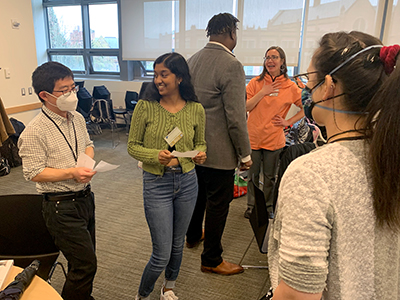Discussion Summaries

Participants answered the following questions in small groups. Answers were recorded and are shared below.
Building on information shared during morning sessions, what other strategies, opportunities, and activities could potentially support neurodiversity postsecondary students? What resources would you like to see shared more broadly with postsecondary faculty and staff? What new resources are needed?
- Focus on PDF elimination and switching to HTML-based resources.
- Make it a regulation for course instructors and program leaders to provide disability services contact information and example accommodations to all students within the first two weeks of study.
- Encourage and promote students speaking with disability services. Disability services professionals know what accommodations are available, what documentation is required, and how to work with students to provide guidance and pair those accommodations appropriately. Some students think that they need to know what accommodations they need before they can reach out for support—let’s encourage the idea that they don’t need to know anything about accommodations before contacting disability services.
- Provide social narratives for getting accommodations through disability services.
- Change formal language into case studies that focus on story and emotional investment instead of dry jargon.
- Separate knowledge checks and skill practice in classes.
- Have professionals provide communication seminars and training opportunities for faculty and staff who work with neurodiverse learners.
- Create a space with no judgment, where staff and faculty can ask questions.
- Promote educators or schools having all students fill out an anonymous first day survey, inviting students to share how the instructor might enhance their learning experience.
- Create a faculty community, possibly led by the department chair or director, that rallies other faculty to make changes. Create a TA community interested in taking on accessibility issues.
- UD can be overwhelming for faculty; encourage faculty to make incremental, small changes.
- Update facilities to meet students’ needs.
Building on information shared during the student panel and other CBI sessions, what do you plan to do differently at your campus to better serve students? What additional training or resources would be helpful for faculty and staff on your campus?
- Work more closely with our Disability Support Services Office to reduce barriers. In particular, templates for starting conversations about accommodations for both students and faculty.
- Host listening sessions focused on neurodivergent students.
- Add welcoming language to campus tours and orientations.
- Identify training on multiple disabilities, intersectionality, and assistive technology (for neurodiverse learners).
- Host a panel of neurodiverse students and post a recording on our instructional learning web page.
- Create resources on building social narratives.
- Develop a website that features resources highlighted at the institute and resources from our own campus. Promote the website at our faculty resources office.
- Host a “Just Do One Thing” for accessibility at faculty meetings.
- Pass along take-homes to our teaching support team.
- Change the way we create Canvas announcements and organize documents to be more easily read by screen readers.
- Offer training on how to improve web page and document design to be more accessible across campus.
- Ask instructors to remind students to not approach service animals without permission.
- Be proactive when receiving letters of accommodation; reach out to the student to see if they would like to discuss their accommodation(s).